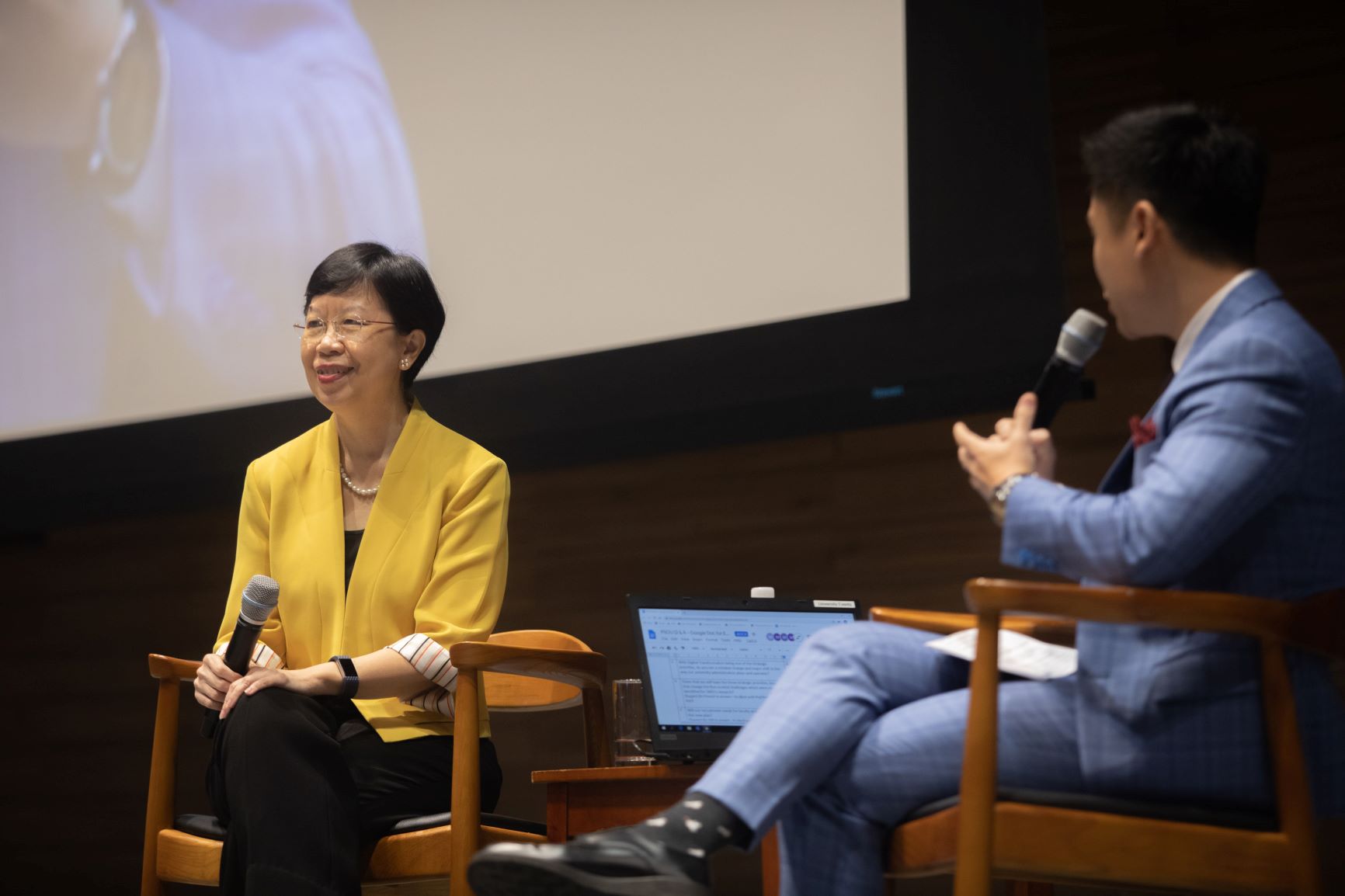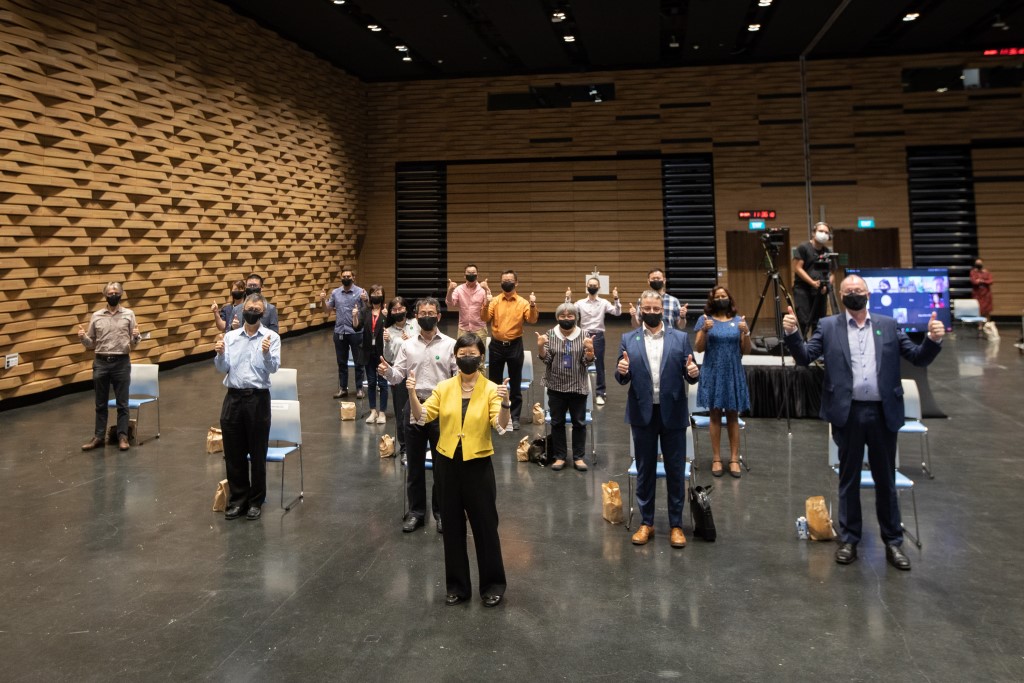
In her second annual State of the University Address on 3 September, SMU President Professor Lily Kong reviewed what has been an eventful year and revealed SMU’s priorities for the next five years in order to realise Vision 2025. In view of the measures put in place as a result of the COVID-19 pandemic, the Address was a hybrid event with around 50 members of faculty and staff joining her at SMU Hall and some 650 participating online for the Address and live Q&A dialogue.

SMU’s response to COVID-19
Prof Kong began her Address with a review of how the University pivoted quickly as One SMU in response to the Covid-19 pandemic to keep the community safe while continuing to maintain the highest standards in education and research.
“We have been able to handle the many challenges over the past months because of teamwork, collaboration, the rapid development of digital and technological solutions and enhanced processes,” she said.
SMU 2025
Prof Kong moved on to outline SMU’s strategic plan for the next five years. Since Vision 2025 was first unveiled in 2014, SMU has steadily grown in the breadth and depth of its accomplishments, she said. The University has successfully made meaningful impact in myriad ways on Singapore’s economy and society.
From 2020, SMU enters the second phase of this journey, at a time when the world is facing new challenges and opportunities – not least those presented by the COVID-19 pandemic. The University must respond and refocus its resources and energies accordingly.
The President explained that SMU has selected three PRIORITIES that serve as cross-disciplinary focal points cutting across its six Schools and focusing efforts on areas of particular economic and social relevance to the nation and region.
Digital Transformation
- Spearhead cutting-edge ideas to digitally transform the private and public sectors
- Develop robust insights into the impact of digitalisation on customer and citizen experience
Sustainable Living
- Drive solutions in managing climate change and sustainable city living, enhancing quality of life
- Shape legal, regulatory and financing frameworks to build healthier and happier societies
Growth in Asia
- Offer a deep understanding of Asia’s economy, polity and society
- Contribute to the region’s growth and manage the ensuing impacts
These priorities were selected because they address the future needs of Singapore, the regional economy and community; they position students well for the future and draw on a wealth of faculty expertise; they align with SMU’s unique strengths; provide meaningful opportunities for staff contributions; and, capture the interest of external stakeholders as potential collaborators and benefactors.
These three priorities provide focus for SMU’s STRATEGIES, which remain:
- Nurturing global citizens for tomorrow through transformative education
- Addressing societal challenges through cutting edge research
- Engaging with the city and world to make meaningful impact
These cross-disciplinary strategies create impact in the three priorities through strengthening SMU’s reputation among students and employers, conducting leading research with direct societal impact, and building a green and digitally connected university.
Prof Kong affirmed that the “4Is” which she discussed in her State of the University Address 2019 are SMU’s ENABLERS which differentiate the University and are critical to its success:
- Industry – Strengthen industry engagement
- Innovation – Support innovation and entrepreneurship activities
- Internationalisation – Expand SMU’s international footprint and connections through like-minded partners and institutions
- Integration – Develop more integrated One SMU approaches in multiple activities and offerings
Underpinning all these are UNIVERSITY FUNDAMENTALS, or foundational enablers, which are critical to the success of all institutes of higher learning:
- People – Retain, develop and attract world-class faculty, staff and researchers
- Resources – Attract high-quality students with strong potential and establish a robust financial base
- Infrastructure – Ensure adequate physical space/facilities and digital infrastructure/services and build a strong research support infrastructure
Focus, Framework, Freedom
Together, said Prof Kong, this constitutes SMU’s strategic plan. It gives the University’s faculty and staff focus, provided in the form of a framework of strategies and enablers, with specific strategic and enabling initiatives to carry through the Vision, within which there is freedom to come up with new ideas and initiatives.
Participants at SMU and online were invited to watch a short video clip that summarises SMU’s aspirations.
Prof Kong, announced that more information about these plans would be made available on the Vision 2025 page of the SMU website right after the event. Faculty and staff will have additional opportunities to discuss the SMU 2025 strategic plans in various townhall engagement sessions, and she urged everyone to join the sessions most appropriate to them to learn more and to contribute their thoughts and ideas.
“Our SMU2025 strategic plan will guide this next phase of growth, focusing our resources around three priorities to maximise impact in education, research and outreach. Working together as One SMU, in the spirit with which we are helping to fight a global pandemic, we can shine as a model city university,” she said. “And, by the time we celebrate SMU’s 25th Anniversary, our Silver Jubilee, I am confident that we will have realised Vision 2025.”

Endorsements of SMU 2025
The distinctive advantage SMU can offer under the heading Digital Transformation is to maximise the value-add using data, logic and knowledge.
Prof Maxwell King (Member, Board of Trustees)
In the area of Sustainable Living, with COVID-19, SMU could be the university that provides extended insights and commentaries to governments and experts on a range of issues that are not medically related such as mob anxiety, impact on growth, and disruptions to gig economy.
Paul Beh (Member, Board of Trustees)
The flexibility to make adjustments to the strategic plan is important as change is the only constant. We are strategising for change rather than to last.
Lau Kai Cheong (Chief Information Officer / Vice President)
Colleagues seemed genuinely excited by the plans. I too am excited about the plans and would love to be part of a university with the ambitions laid out and the resolve to meet them.
Sunita Chatta (Senior Deputy Director, PVO)
I like it that disciplinary research is valued but that, as a University, there are three strategic priority areas that have been identified after a careful process that goes back to the Ideation Tables.
Hoon Hian Teck (Dean, School of Economics)
The strategic priorities are a timely and topical way to integrate and align the diverse research interests of the SMU faculty. I am excited to see the interdisciplinary potential of the strategic priorities be realised in years to come.
Orlando Woods (Assistant Professor of Humanities)